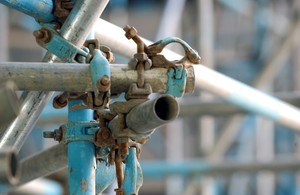TRA plans to extend tariffs on hot rolled flat and coil steel
The Trade Remedies Authority (TRA) proposes to extend measures on hot rolled flat and coil steel imports from China, Russia, Brazil and Iran, but remove them for Ukraine.

scaffolding
The Trade Remedies Authority (TRA) has published its initial findings in transition reviews into trade remedy measures on imports of hot rolled flat and coil steel from China, Russia, Ukraine, Brazil and Iran.
The TRA is reviewing three measures:
- Anti-dumping measures on imports from China.
- Countervailing measures on imports from China
- Anti-dumping measures on imports from Russia, Ukraine, Brazil and Iran(RUBI).
The TRA proposes to extend the measures on imports from China, Russia, Brazil and Iran but remove them for Ukraine, as it concluded that dumping of products from Ukraine was unlikely to recur, due to reduction in Ukraine’s production capacity and limits on the ability to export caused by the war with Russia. The TRA also took into account Ukraine’s requirement to rebuild steel production facilities and domestic demand for steel to rebuild the country’s infrastructure.
The TRA also proposes to extend its current suspension of measures on imports of this product from Ukraine for another 12 months, which will allow time for the review to be completed.
Steel that makes up a third of global production
This product covers hot-rolled flat products of iron, non-alloy and other alloy steel. It’s commonly used as a raw material for other types of steel and makes up almost 1/3 of all steel production globally.
The TRA carried out all three reviews in parallel to reduce the administrative burden on affected industries. Its initial findings are published in reports (known as a Statement of Essential Facts) on its public file. If you think your business may be affected, you can register to comment by 10 April 2023. The TRA will consider any further evidence and submit its final recommendations to the Secretary of State.
Suspending tariffs for imports from Ukraine
Tariffs on imports of this product from Ukraine have been suspended since August 2022. The suspension is due to end on 30 May 2023. The TRA proposes that the measure on Ukraine imports is revoked. However, in the meantime the TRA will assess whether the suspension on tariffs for Ukrainian imports should be extended for a further 12 months.
TRA Chief Executive Oliver Griffiths explains: “Following thorough analysis, our conclusion is that UK steel producers would be harmed if protection against unfair imports from China, Russia, Brazil or Iran was removed. We have concluded that the impact of the war and subsequent reconstruction in Ukraine means that there is little likelihood of Ukraine dumping hot rolled steel products into the UK.”
Background
- The TRA is the UK body that investigates whether trade remedy measures are needed to counter unfair import practices and unforeseen surges of imports. Trade remedies are usually applied at the border as a duty on imports.
- Trade remedy investigations were carried out by the EU Commission on the UK’s behalf until the UK left the EU. Over 40 EU trade remedy measures of interest to UK producers were transitioned into UK law when the UK left the EU and the TRA is currently reviewing each one to check if it is suitable for UK needs.
- Anti-dumping duties allow a country or union to take action against goods which are being sold at less than their normal value – this is defined as the price for ‘like goods’ sold in the exporter’s home market.
- Countervailing measures are put in place to counter imports being sold at unfair prices due to government subsidies in their country of origin.
- These measures are two of the three types of trade remedies – along with safeguard measures which address sudden, unforeseen floods of imports – that are allowed under World Trade Organisation (WTO) rules.
- Period of Investigation – when the TRA is investigating dumping and subsidy cases, it will use a period of investigation of around a year. The TRA will aim for the end point to be as close as possible to the date of initiation. However, this will be decided on a case-by-case basis.
- Period of injury – the injury period will usually cover the period of investigation and normally the 36 months immediately before this (i.e. 48 months in total). TRA investigators look at evidence of injury over a longer period than the general period of investigation so that they can assess trends and other factors in more detail than if they looked at a single year.